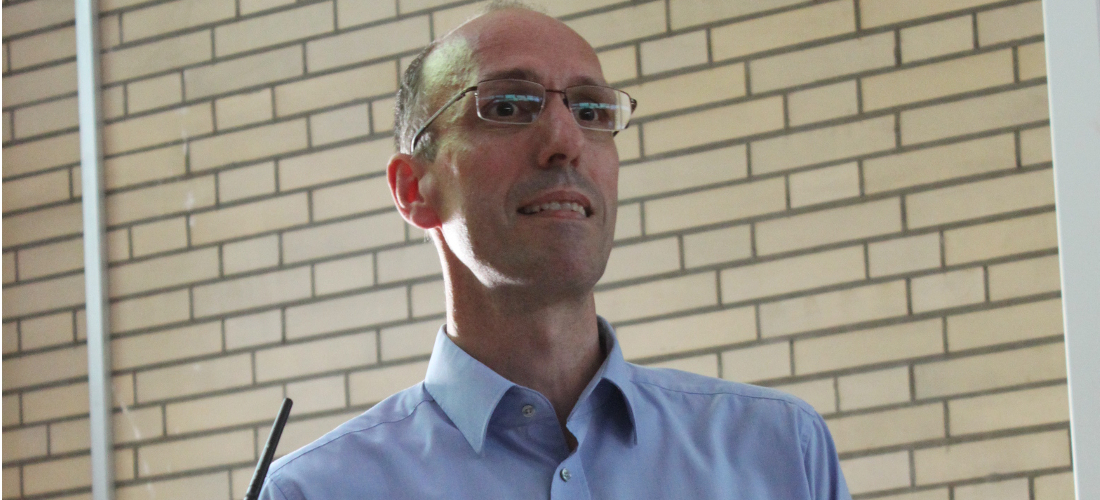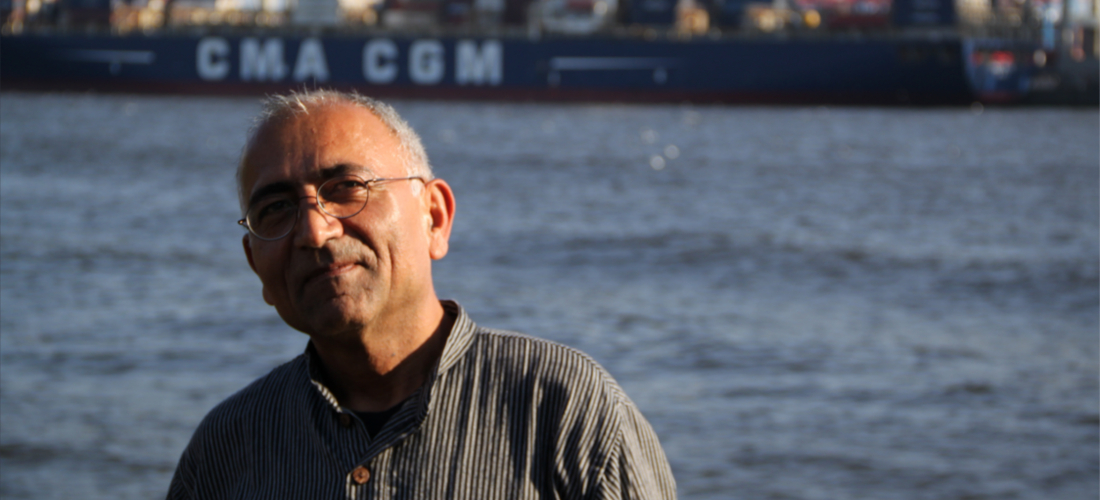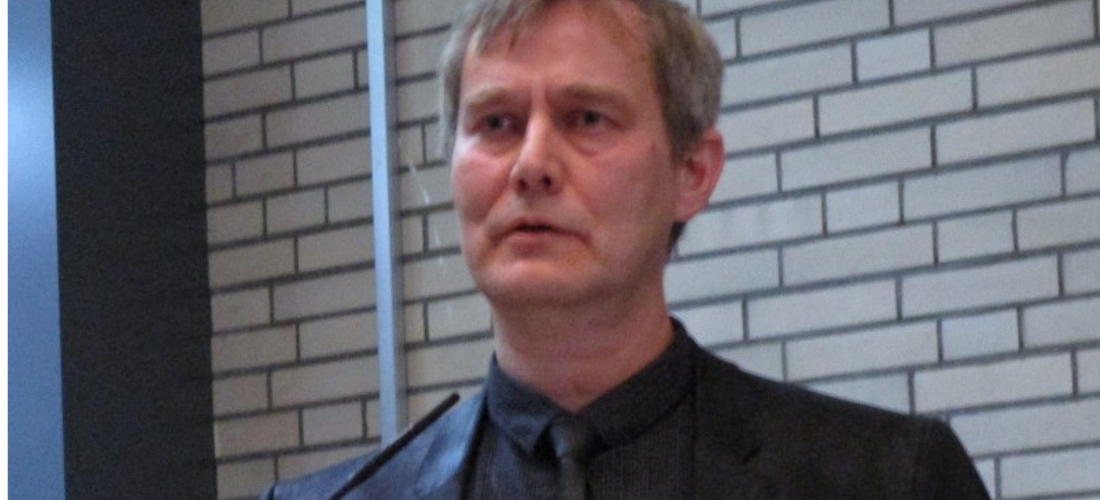Allgemein, Creative Commons, Hamburg Open Online University, Interview, Podcast
#5 Nachwort: Prof. Dr. Ulrich Mücke – Liberaler Rassismus. Der Altonaer Kaufmann Heinrich Witt und die (post-)koloniale Welt des 19. Jahrhunderts
Im #5 Nachwort sprechen wir mit Prof. Dr. Ulrich Mücke (Hamburg) über den deutschen Kolonialismus jenseits von Afrika und Asien und jenseits formaler ‚Schutzgebiete‘. Auf dem lateinamerikanischen Kontinent begann der europäische Kolonialismus und die frühe Globalisierung zudem bereits im… Weiterlesen →
Allgemein, Creative Commons, Hamburg Open Online University, Interview, Podcast
#4 Nachwort: Interview mit Prof. Dr. em. Wolfgang Reinhard – Europa oder China – wo liegt die Mitte der Welt? Ethnozentrische Borniertheit und ihre Überwindung
Der Anspruch die „Mitte der Welt“ zu sein, wird sowohl von Europa als auch von China erhoben. Dieser Selbstverortung gehen wir im #4 Nachwort mit Prof. Dr. Wolfgang Reinhard (Freiburg) nach. Es stellt sich darüber hinaus die Frage einer Verortung… Weiterlesen →
Allgemein, Creative Commons, Hamburg Open Online University, Interview, Podcast
#5 Was bedeutet Hamburg für Dich? Interview mit Ali Fathi. Ein Audio-Spaziergang zu kolonialen Erinnerungsorten
Unser Audio-Spaziergang „Was bedeutet Hamburg für Dich?“ präsentiert diese Woche ein Interview mit dem Kommunikationswissenschaftler Dr. Ali Fathi. In dem Interview werden weitere koloniale Landschaften Hamburgs entdeckt. Fathi erzählt aus seiner Biographie, die ihn aus dem Iran nach Hamburg führte. Wir sprechen über Flucht und das Ankommen… Weiterlesen →
Allgemein, Hamburg Open Online University, Interview, Podcast
#3 Nachwort: Interview mit Prof. Dr. Dirk van Laak – Die Repräsentation von Kolonialgeschichte und das Hamburger Hafenmuseum
Im #3 Nachwort führt mein Kollegen Kim Todzi ein Interview mit Herrn Prof. Dr. van Laak, nach dessen Vortrag zum„Hamburger Hafen in Welthandel und Globalisierung“. Schwerpunktmäßig wird dabei ein sehr aktuelles Thema behandelt, welches über die Themenstellung der Vorlesung hinaus… Weiterlesen →
Allgemein, Creative Commons, Hamburg Open Online University, Interview
#4 Was bedeutet Hamburg für Dich? Interview mit Soledad Granada. Ein Audio-Spaziergang zu kolonialen Erinnerungsorten.
Unser Audio-Spaziergang „Was bedeutet Hamburg für Dich?“ präsentiert diese Woche ein Interview mit der Sozialwissenschaftlerin und Friedensaktivistin Soledad Granada. Das Interview wird auf Englisch geführt. Als gebürtige Kolumbianerin lebt Frau Granada seit 2013 in Hamburg. In dieser kurzen Zeit hat… Weiterlesen →
Bundesweite Initiativen
freedom-roads.de- Freedom Roads ist eine Wanderausstellung zu kolonialen Straßennamen (bisherige Stationen waren Hamburg, Berlin und München) und ein Onlineprojekt mit einem Debattenforum und einem Blog
- Auf der Webseite findet sich eine erste Übersicht über koloniale Straßennamen in Deutschland
- Das Bündnis „Völkermord ist Völkermord!“ zur Anerkennung des Genozids an den Herero und Nama bietet neben der Möglichkeit, die Petition zu unterschreiben, zahlreiche Informationen, Medienberichte und Onlineressourcen zum Kampf um die Anerkennung des Völkermordes.
- Der Verein „Initiative Schwarze Menschen in Deutschland“ (ISD) engagiert sich antirassistisch und postkolonial und fördert Schwarzes Bewusstsein und eine positive Identitätsfindung Schwarzer Menschen
- Aktuelle Meldungen finden sich auf dem Blog[/fusion_text][/fusion_builder_column][/fusion_builder_row][/fusion_builder_container][fusion_builder_container hundred_percent="yes" overflow="visible" margin_top="40px" margin_bottom="40px" background_color="rgba(255,255,255,0)"][fusion_builder_row][fusion_builder_column type="1_1" layout="1_1" background_position="left top" background_color="" border_size="" border_color="" border_style="solid" spacing="yes" background_image="" background_repeat="no-repeat" padding_top="" padding_right="" padding_bottom="" padding_left="" margin_top="0px" margin_bottom="0px" class="" id="" animation_type="" animation_speed="0.3" animation_direction="left" hide_on_mobile="no" center_content="no" min_height="none" last="no" hover_type="none" link="" border_position="all"][fusion_separator style_type="single solid" sep_color="#e5e5e5" alignment="center" /][fusion_text]
Berlin
Berlin Postkolonial- Der Verein Berlin Postkolonial engagiert sich für eine antirassistische und kolonialismuskritische Kultur der Erinnerung in Berlin und Brandenburg.
- Der Verein bietet Stadtrundgänge und Fortbildungen an und hat u.a. eine online zugängliche Literatursammlung
- Das Bündnis No Humboldt 21 fordert die Aussetzung der Arbeiten am geplanten „Humboldt Forum“ und eine gesellschaftliche Debatte über eine angemessene postkoloniale Erinnerungskultur.[/fusion_text][/fusion_builder_column][/fusion_builder_row][/fusion_builder_container][fusion_builder_container hundred_percent="yes" overflow="visible" margin_top="40px" margin_bottom="40px" background_color="rgba(255,255,255,0)"][fusion_builder_row][fusion_builder_column type="1_1" layout="1_1" background_position="left top" background_color="" border_size="" border_color="" border_style="solid" spacing="yes" background_image="" background_repeat="no-repeat" padding_top="" padding_right="" padding_bottom="" padding_left="" margin_top="0px" margin_bottom="0px" class="" id="" animation_type="" animation_speed="0.3" animation_direction="left" hide_on_mobile="no" center_content="no" min_height="none" last="no" hover_type="none" link="" border_position="all"][fusion_separator style_type="single solid" sep_color="#e5e5e5" alignment="center" /][fusion_text]
Bielefeld
Bielefeld Postkolonial- Die Bürgerinitiative Bielefeld Postkolonial will durch Ausstellungen und regelmäßige Führungen an den Kolonialismus in ihrer Stadt erinnern.
- Neben dem Angebot kolonialgeschichtliche Stadtrundgänge gibt es auf der Webseite der Initiative zudem einen virtuellen Stadtrundgang. Auch die Ausstellung Kauft deutsche Bananen – Kolonialwaren und ihr Handel in Bielefeld ist online einzusehen.[/fusion_text][/fusion_builder_column][/fusion_builder_row][/fusion_builder_container][fusion_builder_container hundred_percent="yes" overflow="visible" margin_top="40px" margin_bottom="40px" background_color="rgba(255,255,255,0)"][fusion_builder_row][fusion_builder_column type="1_1" layout="1_1" background_position="left top" background_color="" border_size="" border_color="" border_style="solid" spacing="yes" background_image="" background_repeat="no-repeat" padding_top="" padding_right="" padding_bottom="" padding_left="" margin_top="0px" margin_bottom="0px" class="" id="" animation_type="" animation_speed="0.3" animation_direction="left" hide_on_mobile="no" center_content="no" min_height="none" last="no" hover_type="none" link="" border_position="all"][fusion_separator style_type="single solid" sep_color="#e5e5e5" alignment="center" /][fusion_text]
Bremen
„Der Elefant!“ e.V.- Der Verein übernimmt die Pflege des ehemaligen Reichskolonialdenkmals in Bremen-Schwachhausen. Die zu einem Antikolonialdenkmal umgewidmete Elefantenskulptur steht dabei im Mittelpunkt vieler Angebote und Aktionen.
- Ziel ist es „Vielfalt, Toleranz und Kreativität“ zu fördern, dabei liegt der Fokus auf kulturelle und künstlerische Veranstaltungen, der Verein bezeichnet sich selbst als „politisch und konfessionell neutral.“[/fusion_text][/fusion_builder_column][/fusion_builder_row][/fusion_builder_container][fusion_builder_container hundred_percent="yes" overflow="visible" margin_top="40px" margin_bottom="40px" background_color="rgba(255,255,255,0)"][fusion_builder_row][fusion_builder_column type="1_1" layout="1_1" background_position="left top" background_color="" border_size="" border_color="" border_style="solid" spacing="yes" background_image="" background_repeat="no-repeat" padding_top="" padding_right="" padding_bottom="" padding_left="" margin_top="0px" margin_bottom="0px" class="" id="" animation_type="" animation_speed="0.3" animation_direction="left" hide_on_mobile="no" center_content="no" min_height="none" last="no" hover_type="none" link="" border_position="all"][fusion_separator style_type="single solid" sep_color="#e5e5e5" alignment="center" /][fusion_text]
Dortmund
Dortmund Postkolonial- Dortmund Postkolonial ist eine lokalhistorische Initiative, die sich mit der (post-)kolonialen Geschichte Dortmunds beschäftigt.
- Die Themen Kolonialbewegung, Mission, Wirtschaft, Alltag sowie die Antikoloniale Bewegung werden im Kontext des Kolonialimus erklärt. Außerdem gibt es ein Die Initiative weist auf aktuelle Veranstaltungen hin und berichtet über für die Initiative relevante Geschehen.[/fusion_text][/fusion_builder_column][/fusion_builder_row][/fusion_builder_container][fusion_builder_container hundred_percent="yes" overflow="visible" margin_top="40px" margin_bottom="40px" background_color="rgba(255,255,255,0)"][fusion_builder_row][fusion_builder_column type="1_1" layout="1_1" background_position="left top" background_color="" border_size="" border_color="" border_style="solid" spacing="yes" background_image="" background_repeat="no-repeat" padding_top="" padding_right="" padding_bottom="" padding_left="" margin_top="0px" margin_bottom="0px" class="" id="" animation_type="" animation_speed="0.3" animation_direction="left" hide_on_mobile="no" center_content="no" min_height="none" last="no" hover_type="none" link="" border_position="all"][fusion_separator style_type="single solid" sep_color="#e5e5e5" alignment="center" /][fusion_text]
Dresden
Dresden Postkolonial- Die Hochschulgruppe Dresden Postkolonial bietet neben Stadtrundgängen auf ihrer Webseite Informationen zu einzelnen thematischen Bereichen (einige davon noch im Aufbau) und eine Karte mit (post-)kolonialen Spuren in Dresden an.[/fusion_text][/fusion_builder_column][/fusion_builder_row][/fusion_builder_container][fusion_builder_container hundred_percent="yes" overflow="visible" margin_top="40px" margin_bottom="40px" background_color="rgba(255,255,255,0)"][fusion_builder_row][fusion_builder_column type="1_1" layout="1_1" background_position="left top" background_color="" border_size="" border_color="" border_style="solid" spacing="yes" background_image="" background_repeat="no-repeat" padding_top="" padding_right="" padding_bottom="" padding_left="" margin_top="0px" margin_bottom="0px" class="" id="" animation_type="" animation_speed="0.3" animation_direction="left" hide_on_mobile="no" center_content="no" min_height="none" last="no" hover_type="none" link="" border_position="all"][fusion_separator style_type="single solid" sep_color="#e5e5e5" alignment="center" /][fusion_text]
Frankfurt
Frankfurt Postkolonial- Die Initiative bietet Stadtrundgänge und regelmäßige Treffen an.
- Auf der Webseite kann ein Stadtplan zur (post-)kolonialen Geschichte Frankfurts heruntergeladen werden.[/fusion_text][fusion_text]Institut für Postkoloniale Studien - Frankfurt (IfPS)
- Das Institut für Postkoloniale Studien - Frankfurt (IfPS) ist eine im Jahre 2014 von Studierenden und Lehrenden der Goethe-Universität Frankfurt gegründete Initiative.
- Das IfPS arbeitet interdisziplinär zu den Postkolonialen Studien, so auch gezielt zu den Themen Rassismus, Anti-Semitismus, Gender und Klassenverhältnissen und bietet autonome Kolloquien, Ringvorlesungen, Postkoloniales Kino (Filmabende), Lesekreise, postkoloniale Stadtpolitik und allgemeine Vorträge rund um die Postkolonialen Studien an.
- Das IfPS ist erreichbar unter Facebook (https://www.facebook.com/frankfurt.postkolonial/) und per Email (postkoloniale.theorie@gmail.com).
Freiburg
Freiburg postkolonial- Die von Heiko Wegmann gegründete Webseite freiburg-postkolonial.de ist seit 2005 online und ist damit eine der ältesten postkolonialen Initiativen im Netz.
- Hintergrundtexte, Quellendokumente und Audiodateien sind Teil einer umfangreichen thematischen Sammlung. Zudem gibt es aktuelle Hinweise auf Veranstaltungen und postkoloniale Stadtrundgänge.
- 2015 feiert die Initiative ihr zehnjähriges Bestehen mit einer Veranstaltungsreihe vom 16.9.2015 – 10.11.2015.
Hamburg
Arbeitskreis Hamburg Postkolonial- Der Arbeitskreis Hamburg Postkolonial organisiert gemeinsam mit dem Eine Weltnetzwerk Hamburg e.V. regelmäßig Stadtrundgänge zu Kolonialismus, Migration und Globalisierung. [/fusion_text][/fusion_builder_column][/fusion_builder_row][/fusion_builder_container][fusion_builder_container hundred_percent="yes" overflow="visible" margin_top="40px" margin_bottom="40px" background_color="rgba(255,255,255,0)"][fusion_builder_row][fusion_builder_column type="1_1" layout="1_1" background_position="left top" background_color="" border_size="" border_color="" border_style="solid" spacing="yes" background_image="" background_repeat="no-repeat" padding_top="" padding_right="" padding_bottom="" padding_left="" margin_top="0px" margin_bottom="0px" class="" id="" animation_type="" animation_speed="0.3" animation_direction="left" hide_on_mobile="no" center_content="no" min_height="none" last="no" hover_type="none" link="" border_position="all"][fusion_separator style_type="single solid" sep_color="#e5e5e5" alignment="center" /][fusion_text]
- Das Eine Welt Netzwerk ist der Dachverband entwicklungspolitischer Initiativen in Hamburg.
- Gemeinsam mit der Hafengruppe Hamburg und dem Pharus Verlag entwickelte das Eine Welt Netzwerk u.a. den Stadtplan hamburg-postkolonial.[/fusion_text][/fusion_builder_column][/fusion_builder_row][/fusion_builder_container][fusion_builder_container hundred_percent="yes" overflow="visible" margin_top="40px" margin_bottom="40px" background_color="rgba(255,255,255,0)"][fusion_builder_row][fusion_builder_column type="1_1" layout="1_1" background_position="left top" background_color="" border_size="" border_color="" border_style="solid" spacing="yes" background_image="" background_repeat="no-repeat" padding_top="" padding_right="" padding_bottom="" padding_left="" margin_top="0px" margin_bottom="0px" class="" id="" animation_type="" animation_speed="0.3" animation_direction="left" hide_on_mobile="no" center_content="no" min_height="none" last="no" hover_type="none" link="" border_position="all"][fusion_separator style_type="single solid" sep_color="#e5e5e5" alignment="center" /][fusion_text]
- Die Hafengruppe Hamburg organisiert regelmäßige Hafenrundfahrten zu Kolonialismus, Migration und Globalisierung. [/fusion_text][/fusion_builder_column][/fusion_builder_row][/fusion_builder_container][fusion_builder_container hundred_percent="yes" overflow="visible" margin_top="40px" margin_bottom="40px" background_color="rgba(255,255,255,0)"][fusion_builder_row][fusion_builder_column type="1_1" layout="1_1" background_position="left top" background_color="" border_size="" border_color="" border_style="solid" spacing="yes" background_image="" background_repeat="no-repeat" padding_top="" padding_right="" padding_bottom="" padding_left="" margin_top="0px" margin_bottom="0px" class="" id="" animation_type="" animation_speed="0.3" animation_direction="left" hide_on_mobile="no" center_content="no" min_height="none" last="no" hover_type="none" link="" border_position="all"][fusion_separator style_type="single solid" sep_color="#e5e5e5" alignment="center" /][fusion_text]
- Afrika-hamburg.de war ein Kunstprojekt (2004/2005) und ist eine Webseite zur Kolonialgeschichte Hamburgs.[/fusion_text][/fusion_builder_column][/fusion_builder_row][/fusion_builder_container][fusion_builder_container hundred_percent="yes" overflow="visible" margin_top="40px" margin_bottom="40px" background_color="rgba(255,255,255,0)"][fusion_builder_row][fusion_builder_column type="1_1" layout="1_1" background_position="left top" background_color="" border_size="" border_color="" border_style="solid" spacing="yes" background_image="" background_repeat="no-repeat" padding_top="" padding_right="" padding_bottom="" padding_left="" margin_top="0px" margin_bottom="0px" class="" id="" animation_type="" animation_speed="0.3" animation_direction="left" hide_on_mobile="no" center_content="no" min_height="none" last="no" hover_type="none" link="" border_position="all"][fusion_separator style_type="single solid" sep_color="#e5e5e5" alignment="center" /][fusion_text]
- Decolonizing Hamburg ist ein Blog zu (post-)kolonialen Themen in Hamburg und darüber hinaus.[/fusion_text][/fusion_builder_column][/fusion_builder_row][/fusion_builder_container][fusion_builder_container hundred_percent="yes" overflow="visible" margin_top="40px" margin_bottom="40px" background_color="rgba(255,255,255,0)"][fusion_builder_row][fusion_builder_column type="1_1" layout="1_1" background_position="left top" background_color="" border_size="" border_color="" border_style="solid" spacing="yes" background_image="" background_repeat="no-repeat" padding_top="" padding_right="" padding_bottom="" padding_left="" margin_top="0px" margin_bottom="0px" class="" id="" animation_type="" animation_speed="0.3" animation_direction="left" hide_on_mobile="no" center_content="no" min_height="none" last="no" hover_type="none" link="" border_position="all"][fusion_separator style_type="single solid" sep_color="#e5e5e5" alignment="center" /][fusion_text]
Hannover
Koloniale-Spuren- Die 2003 – 2004 entstandene Webseite des Studierenden-Projektes „Spuren des Kolonialismus in Hannover“ des historischen Seminars der Universität Hannover sammelt Informationen über kolonialgeschichtliche Personen, Denkmäler, und Straßen.[/fusion_text][/fusion_builder_column][/fusion_builder_row][/fusion_builder_container][fusion_builder_container hundred_percent="yes" overflow="visible" margin_top="40px" margin_bottom="40px" background_color="rgba(255,255,255,0)"][fusion_builder_row][fusion_builder_column type="1_1" layout="1_1" background_position="left top" background_color="" border_size="" border_color="" border_style="solid" spacing="yes" background_image="" background_repeat="no-repeat" padding_top="" padding_right="" padding_bottom="" padding_left="" margin_top="0px" margin_bottom="0px" class="" id="" animation_type="" animation_speed="0.3" animation_direction="left" hide_on_mobile="no" center_content="no" min_height="none" last="no" hover_type="none" link="" border_position="all"][fusion_separator style_type="single solid" sep_color="#e5e5e5" alignment="center" /][fusion_text]
Heidelberg
schwarzweiss- Die Initiative schwarzweiss beschäftigt sich mit der (De-)Konstruktion von Selbst– und Fremdbildern. Betrachtungen des (Post-)Kolonialismus, Gender, Migration und Wahrnehmung des „Anderen“ sind unter anderem Themen der regelmäßig stattfindenden Veranstaltungen und der Beiträge auf der Webseite.
- Auf der Seite gibt es ein Begriffslexikon, in dem gängige Begriffe kritisch beleuchtet werden.[/fusion_text][/fusion_builder_column][/fusion_builder_row][/fusion_builder_container][fusion_builder_container hundred_percent="yes" overflow="visible" margin_top="40px" margin_bottom="40px" background_color="rgba(255,255,255,0)"][fusion_builder_row][fusion_builder_column type="1_1" layout="1_1" background_position="left top" background_color="" border_size="" border_color="" border_style="solid" spacing="yes" background_image="" background_repeat="no-repeat" padding_top="" padding_right="" padding_bottom="" padding_left="" margin_top="0px" margin_bottom="0px" class="" id="" animation_type="" animation_speed="0.3" animation_direction="left" hide_on_mobile="no" center_content="no" min_height="none" last="no" hover_type="none" link="" border_position="all"][fusion_separator style_type="single solid" sep_color="#e5e5e5" alignment="center" /][fusion_text]
Hessen
Hessen (post)kolonial- Hessen (post)kolonial ist eine umfangreiche Spurensuche der kolonialen Geschichte Hessens, durch das historische Seminar der Justus-Liebig-Universität Gießen.
- Auf der Webseite findet sich eine Sammlung von Personen, Institutionen, Unternehmen, Koloniale Repräsentationen, Kolonialkritische Akteure und Akteurinnen, sowie eine Zeitleiste und eine Bibliographie.[/fusion_text][/fusion_builder_column][/fusion_builder_row][/fusion_builder_container][fusion_builder_container hundred_percent="yes" overflow="visible" margin_top="40px" margin_bottom="40px" background_color="rgba(255,255,255,0)"][fusion_builder_row][fusion_builder_column type="1_1" layout="1_1" background_position="left top" background_color="" border_size="" border_color="" border_style="solid" spacing="yes" background_image="" background_repeat="no-repeat" padding_top="" padding_right="" padding_bottom="" padding_left="" margin_top="0px" margin_bottom="0px" class="" id="" animation_type="" animation_speed="0.3" animation_direction="left" hide_on_mobile="no" center_content="no" min_height="none" last="no" hover_type="none" link="" border_position="all"][fusion_separator style_type="single solid" sep_color="#e5e5e5" alignment="center" /][fusion_text]
Köln
Köln Postkolonial- Die Initiative Köln Postkolonial des Vereins KopfWelten – gegen Rassimsus und Intoleranz e.V. sammelt auf ihrer Webseite Institutionen, Unternehmen, Orte, Personen.
- Darüber hinaus finden sich auf der Seite die Ausstellungstafeln der 2008-2009 in Köln gezeigten Ausstellung „Köln Postkolonial – ein lokalhistorisches Projekt der Erinnerungsarbeit“.[/fusion_text][/fusion_builder_column][/fusion_builder_row][/fusion_builder_container][fusion_builder_container hundred_percent="yes" overflow="visible" margin_top="40px" margin_bottom="40px" background_color="rgba(255,255,255,0)"][fusion_builder_row][fusion_builder_column type="1_1" layout="1_1" background_position="left top" background_color="" border_size="" border_color="" border_style="solid" spacing="yes" background_image="" background_repeat="no-repeat" padding_top="" padding_right="" padding_bottom="" padding_left="" margin_top="0px" margin_bottom="0px" class="" id="" animation_type="" animation_speed="0.3" animation_direction="left" hide_on_mobile="no" center_content="no" min_height="none" last="no" hover_type="none" link="" border_position="all"][fusion_separator style_type="single solid" sep_color="#e5e5e5" alignment="center" /][fusion_text]
Leipzig
Leipzig postkolonial- Leipzig postkolonial ist eine Initiative des Vereins Engagierte Wissenschaft e.V..
- Neben Informationen zu Orten, Personen, Ereignissen und Instiutionen werden von der Initiative Stadtrundgänge angeboten.
- Die Initiative hat darüber hinaus einen Stadtplan veröffentlicht, der kostenlos postalisch bestellt werden kann.[/fusion_text][/fusion_builder_column][/fusion_builder_row][/fusion_builder_container][fusion_builder_container hundred_percent="yes" overflow="visible" margin_top="40px" margin_bottom="40px" background_color="rgba(255,255,255,0)"][fusion_builder_row][fusion_builder_column type="1_1" layout="1_1" background_position="left top" background_color="" border_size="" border_color="" border_style="solid" spacing="yes" background_image="" background_repeat="no-repeat" padding_top="" padding_right="" padding_bottom="" padding_left="" margin_top="0px" margin_bottom="0px" class="" id="" animation_type="" animation_speed="0.3" animation_direction="left" hide_on_mobile="no" center_content="no" min_height="none" last="no" hover_type="none" link="" border_position="all"][fusion_separator style_type="single solid" sep_color="#e5e5e5" alignment="center" /][fusion_text]
München
[/fusion_text][/fusion_builder_column][/fusion_builder_row][/fusion_builder_container][fusion_builder_container hundred_percent="yes" overflow="visible"][fusion_builder_row][fusion_builder_column type="1_1" layout="1_1" background_position="left top" background_color="" border_size="" border_color="" border_style="solid" spacing="yes" background_image="" background_repeat="no-repeat" padding_top="" padding_right="" padding_bottom="" padding_left="" margin_top="0px" margin_bottom="0px" class="" id="" animation_type="" animation_speed="0.3" animation_direction="left" hide_on_mobile="no" center_content="no" min_height="none" last="no" hover_type="none" link="" border_position="all"][fusion_text][muc] München postkolonial- Die Initiative sammelt in einem virtuellen Stadtplan (post-)koloniale Spuren in München und bietet einen (post-)kolonialen Stadtplan als Printversion.
- Auf dem Blog der Initiative findet sich aktuelle Hinweise zu Veranstaltungen.[/fusion_text][fusion_separator style_type="single solid" top_margin="40" bottom_margin="40" sep_color="#e5e5e5" alignment="center" /][fusion_text]
Oldenburg
Oldenburg postkolonial- Das Studierenden-Projekt des Instituts für Geschichte der Carl von Ossietzky Universität Oldenburg aus dem Wintersemester 2011/2012 zeigt eine interaktive Karte mit kolonialen Orten Oldenburgs, die mit einer erklärenden Tonspur verknüpft sind. [/fusion_text][fusion_separator style_type="single solid" top_margin="40" bottom_margin="40" sep_color="#e5e5e5" alignment="center" /][fusion_text]
Potsdam
Potsdam postkolonial- Der Arbeitskreis Potsdam postkolonial organisiert Veranstaltungen und bietet Stadtführungen in Potsdam an. Zudem gibt es aktuelle Informationen auf dem Blog und der Facebook-Seite des Arbeitskreises.
Rostock
Rostock postkolonial- Die Initiative Rostock postkolonial ist angegliedert an den Verein Soziale Bildung e.V.
- In einer App bietet die Initiative u.a. einen Stadtrundgang zur kolonialen Geschichte Rostocks an
[fusion_builder_container hundred_percent=“no“ equal_height_columns=“no“ hide_on_mobile=“small-visibility,medium-visibility,large-visibility“ background_position=“center center“ background_repeat=“no-repeat“ fade=“no“ background_parallax=“none“ parallax_speed=“0.3″ video_aspect_ratio=“16:9″ video_loop=“yes“ video_mute=“yes“ border_style=“solid“][fusion_builder_row][fusion_builder_column type=“1_1″ layout=“1_1″ background_position=“left top“ background_color=““ border_size=““ border_color=““ border_style=“solid“ border_position=“all“ spacing=“yes“ background_image=““ background_repeat=“no-repeat“ padding_top=““ padding_right=““ padding_bottom=““ padding_left=““ margin_top=“0px“ margin_bottom=“0px“ class=““ id=““ animation_type=““ animation_speed=“0.3″ animation_direction=“left“ hide_on_mobile=“small-visibility,medium-visibility,large-visibility“ center_content=“no“ last=“no“… Weiterlesen →





